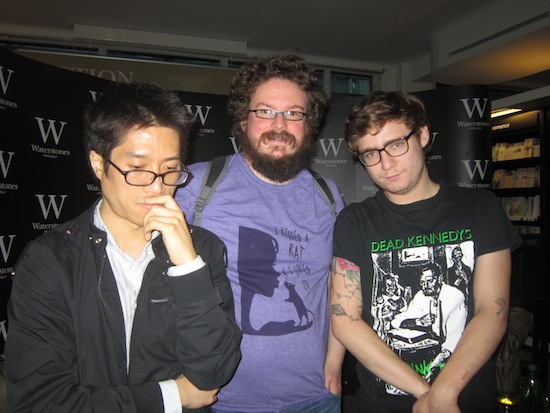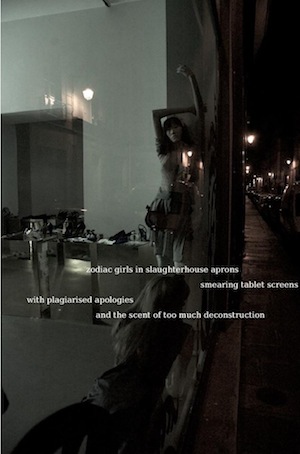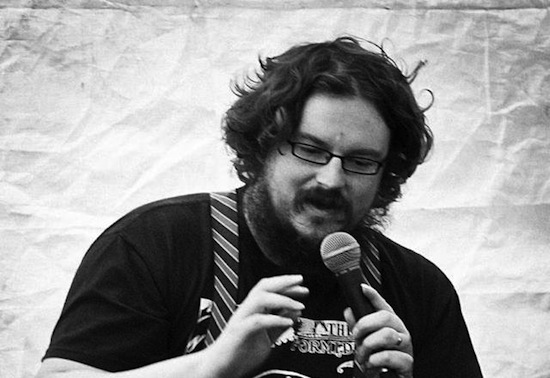‘There is support for what you are doing,’ Gareth said, stirring his coffee. ‘But there is also jealousy… People can be very snide,’ Gareth and I had been friends on Facebook for a while, ever since he submitted work when I briefly edited a small press poetry magazine a few years ago. This was our first meeting in person.
I glanced at an old woman sat on the sofa opposite us, she seemed really sad, on the verge of tears, and I wanted to ask Gareth if we should go and talk to her. Instead, he asked me an odd question. He asked if I’m willing to compromise, to change my work, make it more accessible, so I can realistically make a living from writing. I shook my head, ‘No.’ before considering what he really meant by compromise.
‘Hmm,’ he sighed. ‘You have a family now, and you’re struggling, but you do have a following. If you want to make money as a freelance writer you need to change a few things… Maybe stop writing about drugs and all that stuff. After all, Ghost Town Music is a young man’s book. And writing a poetry column for The Quietus… Don’t you think you are sticking your head above the parapet?’
In my first column for The Quietus it was foolish of me to say I don’t know a hell of a lot about poetry – although there is an element of truth to that, as my formal education was very poor because I was a troubled kid. I still am! For me, poetry is learning to grow up. Although I failed my exams and didn’t go to college or university, and despite getting into drugs and the strange, tragic madness they bring to a person’s life, I spent a great deal of time studying poetry, art and literature on my own terms, around the most extraordinary people. Even when a lot of them were telling me it would never amount to anything – because no one in this town amounts to anything – I kept reading and writing and creating. So I do know a hell of a lot about poetry, just not in the way one might expect – it’s not always about the best words in the best order or whatever, it is a way of life, it is a way out, and it belongs to everybody.
Gareth dropped me off near my house. I thanked him for his advice, but my head was spinning. I wondered what he meant by compromise. Before he left we stood in the car park and quickly discussed poetry workshops, the money that can be made from being a writer, if only I would compromise… and, as I scanned the activity of local junkies gathering under the trees, wondering what poetry could ever do for them, Gareth and I came to an agreement. We agreed that, although I’m not an authority on poetry, I am definitely an authority on something.
It is better to try to be extraordinary and fail than to try to be ordinary and succeed
That’s what it says at the top of the page when I click on Dan Holloway’s website. I’m familiar with Dan’s work, mostly from the books available on his website, and poetry such as this:
I am a poet.
I am not a teacher.
I am not a politician or a preacher or an angel-headed
hipster.
I’m just a guy who spits his heart out through his lips.
(from i cannot bring myself to look at walls in case you have graffitied them with love poetry):
And this:
“Sometimes I ride the subway all day and no one sees me; I’ll walk the carriage and see a pair of tits and hang them in the tit gallery in my head. I look through the cloth and between the buttons and where the edge of the fabric comes loose from the skin and I trace the curve of the tits, and the pert, plump fullness of the tits and the sleek pointed skin tapering the tits to the nipples; and I go home and walk all night through the rooms of my tit gallery and I come and the voice says come on my tits and fingers touch and we come together in the tit gallery in my head.”
(from (Life:) Razorblades Included)
But it wasn’t until the self-publication of his experimental novel Evie and Guy that I really started to take Dan Holloway seriously. I should explain what I mean by that – my head is above the parapet after all. When I take a poet or an artist seriously I mean their work affects and inspires me, it informs my own art. Suddenly there’s a connection I didn’t have before, and that connection can transport me to undiscovered continents of thought, questions, ideas that help me re-evaluate my own work and its place in the world. So after reading Dan Holloway’s poetry, prose, blog posts and, finally, a novel written wholly using numbers, I took him seriously.And so should you. He’s got a lot of important things to say, and he’s not afraid to say them.
It is difficult for me to ask questions that you haven’t already answered in your work or on your regular blog posts. What are you wearing?
I’d love to say pink PVC and a gimp mask made of human skin, or even a bra woven from nylon orchids, but I can’t. I’ve just come back from the gym.
If your entire creative output was a horror film, which horror film would it be and why?
Hmm, depends on my mood. We all have days when we’re convinced everything we’ve ever done is Jaws 3D. But when I’m not, possibly Suspiria – alternating garish colours and Chiaroscuro with a thumping electronica soundtrack. Then again, I could make a case for the slow roiling lyricality of something like Victor Erice’s Spirit of the Beehive, or the unsettling disjointedness of Bernard Rose’s Paperhouse. Is there a film that mixes all three? Possibly Pan’s Labyrinth? I don’t know, I imagine if you asked a hundred poets they’d all want to say Pan’s Labyrinth. Mm, yes, got it – Henri-Georges Clouzot’s Les Diaboliques. Perfect.
You make a pact with the devil and sell your soul, what do you ask for in return?
Well it depends. If it’s meant for real, there are worse places my soul could go than the devil, but I’d still rather keep it, so it better be something worth having. Complete, equal global redistribution of wealth maybe, or an end to marginalisation. If you mean metaphorically do I get to choose the metaphor? I’m guessing it’d probably be having a publisher. What would I want for that? I think about that all the time and I honestly don’t know. Sometimes I think I’d never do it, other times I think the guarantee of next month’s rent would be enough. Being self-published feels like running uphill through sand sometimes and I only have so much energy to lose before the freedom of writing what I want is less of a pleasure than not having to battle to be taken seriously.
I’m not sure where I stand on self-publishing, despite self-publishing some of my own work (both on-line and flogging homemade pamphlets to stoners in pubs), something about it still bothers me. Why do you think that is?
Where do you want me to start! Self-publishing, or rather the discourse around self-publishing, has become obsessed with sell, sell, sell. It’s gone from being an underground anti-commercial protest movement that was doing things that were largely shit but always interesting to a capitalist gold-rush doing things that are largely shit and rarely if ever interesting. That’s a generalisation, of course. There are amazing people self-publishing – Sarah Hymas and Lucy Furlong in poetry.Andy Harrod in multimedia. Rohan Quine and Marc Nash producing novels. And there are lots of people for whom the art is everything. But the media doesn’t really want to know about them. So we get pushed further to the side. The upshot of that is you don’t get taken seriously as an artist. People who would pore over your work for nuance and reference if you had some kind of imprimatur just assume you’ve done it the way you have as a gimmick or because you’re a bit stupid. That winds me up terribly, and I don’t know what to do about it. A lot of the time I think sod it, I’ll get a publisher. I’ve had interest now for my last two books – my poetry collection i cannot bring myself to look at walls in case you have graffitied them with love poetry, and Evie and Guy, the novel I wrote wholly in numbers – but I decided I owed it to trying to break down those barriers to self-publish my best work (if any publisher wants my schlocky thriller, they’re welcome to it!). The result has been hideously frustrating. I’ve had so many emails from people saying they loved Evie and Guy in particular but they’ll never say so in public. If I’d got a small hip press to publish it, they’d have written pieces here, there and everywhere I’m sure. But I shouldn’t have to do that. It’s the same book. I think the media has learned to be lazy about self-publishing – it’s really not hard to find the jewels, but they repeat the same old tired tropes about endless impossible sifting then shrug their shoulders and walk away as though it’s not their job to dig and dig till they unearth great art. I think we have to keep calling them out on it every time they turn around and refuse to look at or review or write about self-published art.
Your work deals with relationships and identity. It is dark and fleshy. There’s a lot of blood, and bodily fluids in general. Do you think content like this makes live performances of your work more uncomfortable?
Ha! [See the video of the Literary Death Match judges linked in the next question and see the reading here]. It’s a fascinating question, though, and I first really thought about it when Mark Williams asked me to write a piece about reading sensitive material to live audiences. I think my answer is the same as it was then. I never feel nervous if I know what I’m reading comes from the right place. So when I’m reading something confessional or transgressive, I have never felt the slightest qualm, because those are the most serious pieces I’ve ever written, and I know there’s not a hint of gimmickry or desire to shock or exploitation in them. And I think the audience picks that up to – certainly those pieces have been the ones that have brought the strongest positive reaction. ‘The Last Fluffer in la La Land’, for example, which is the piece I read at Literary Death Match, is an expansion of Brett Easton Ellis’ brilliant opening line in Less Than Zero ‘People are afraid to merge on freeways in Los Angeles’ in which I imagine the symbolic last act of human contact being played out in the San Fernando Valley porn industry. It, like a lot of my transgressive work, is about finding tenderness in impossible places and through impossible acts – in this case using as a metaphor the fact that "fluffing", which is about the most exploitative revolting form of contact you could imagine that is nonetheless within legal norms, has disappeared from the porn industry since the advent of Viagra. It divided the judges’ opinion, which is always good, and Molly Parkin adored it (I still use her quotation on my covers). The other pieces I’ve had that positive a reaction to have all been transgressive ones. I have a series of flash fictions, for example, called ‘The Things We Talked About While She Was Bleeding Out’ which portray imaginary conversations with women during the act of their suicide. I think if there were any hint of a bum note in my intentions in those pieces I would have been (rightly) crucified. As it is, I’ve never had anything but a positive response. Transgression is a high stakes game for a writer. It’s very tempting to be sensationalist – I’ve done it twice, both times in pieces I intended to be more "commercial", and both times I ended up really regretting it and am ashamed of the writing. But if you stay the right side of the line, I think you can hold your head high and I think an audience will, by and large, sense that integrity. I certainly don’t think you should ever pull punches to protect an audience – how utterly cheap and disrespectful to them is that?
Have you ever faced a hostile crowd, hecklers, people trying to interact with you when you are performing, and if so, how do you deal with situations like these?
Not personally while I was performing but I’ve had some close shaves. I was running the event during which we witnessed what has become known as the Great Jericho Poetry Brawl of 2012 (no, seriously, just look at the comments on this piece here in the Guardian ). That began with one of the great heckler put downs. Anna Percy was delivering a heartbreaking poem about a man who locked his wife in the basement when someone walked past the window and shouted to his mate "she’s monologuing" to which Anna responded without missing a beat "it’s poetry, you twat" – it was only when an audience member decided she hadn’t done a fabulous job already and hurtled down the street after the hecklers that the brawl broke out, capped with the immortal line from one of the young lads "I can’t afford to go back to prison, I’m a ballet dancer."
Another time, I was performing at Literary Death Match – one of my more transgressive pieces – and I got smacked down by one of the judges with lines like "I can’t actually look at you after that". But I think my most painful experience on stage was hosting a conversation at Waterstones Piccadilly between Alt Lit darlings Tao Lin and Ben Brooks both of whom were utterly wasted and could barely stand up to make it to their chairs. When he was asked to read, Tao managed to hold his book upside down before throwing it away and declaring it was "crap" and spending the next forty minutes in an unchoreographed giggle-athon with Brooks.

Could you tell me something about these words please?
Alt Lit…
Well that one could take an oversized column in its own right. There’s some incredibly exciting work going on. Penny Goring is one of the most exciting writers in the UK right now.And it’s pretty much the only place where writers are really grappling with questions of identity in the digital age in both medium and subject matter, so it’s an essential corner of the literary world to keep tabs on. It has huge problems of course – there’s a big cult of personality which means more than pretty much any other genre there’s a lot of kowtowing and liking of the right people’s posts, which says a lot about the digital world (often more than the writing itself, which is a shame and shows the kind of gaps there are in the Alt Lit canon – the live-writing sensation from the likes of Megan Boyle is really much less interesting than just following threads as they unfold on forums). Anyone who thinks technology is a democratiser needs to spend some time in the Alt Lit community and they’d soon get a more realistic perspective. The other frustration is the lack of engagement with writing outside of Alt Lit. Insularity isn’t a bad thing in itself, and I actually like best a lot of the writing that is utterly self-absorbed. The problem is when writers think they’re doing something new and aren’t. That all sounds negative, and I’m not really negative at all – I’d just say it’s important for readers to find their own way round the Alt Lit world rather than looking at who’s popular.
Apathy
I should probably be not bothered to answer that. But mainly, I think there’s a lack of widespread engagement with social and political issues from writers which I think is an arrogation of responsibility.A lot of writers say they’re not political, or art isn’t political. And that’s rubbish, and actually makes me really angry – it’s either willful deceit or stupidity.There’s no more political act than claiming apoliticality.I think as a society we still have this massive blindspot that thinks doing nothing is neutral whereas doing something is activist one way or the other and that massively rigs things to the status quo.
Rats…
My favourite creatures in all the world 🙂
Mainstream poetry…
To be honest I’m not really sure what that means. It could mean Pam Ayres, John Cooper Clarke, or Geoffrey Hill. Diplomatically,there are great and not so great elements in all walks of poetry. I’m interested in great poetry wherever it’s found. I just find very little of it in the kind of poetry that newspapers deign to write about.
Coming…
As the good Dr. Lecter would say, you’re waiting for me not to give a sexual response!



